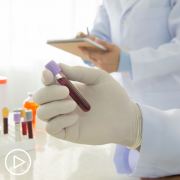What Should Prostate Cancer Patients Know About Clinical Trials?
What Should Prostate Cancer Patients Know About Clinical Trials? from Patient Empowerment Network on Vimeo.
Clinical trials may be intimidating to some prostate cancer patients, so what do they need to know to address their concerns? Dr. Sumit Subudhi explains clinical trials and discusses the benefits of participation.
Dr. Sumit Subudhi is an Associate Professor in the Department of Genitourinary Medical Oncology, Division of Cancer Medicine at The University of Texas MD Anderson Cancer Center. Learn more about Dr. Subudhi.
See More From Prostate Clinical Trials 201
Related Resources

|

Understanding Prostate Cancer Clinical Trial Phases and Types |

What Questions Should Prostate Cancer Patients Ask About Clinical Trials? |
Transcript:
Katherine:
Prostate cancer research really can only move forward through clinical trials and patient participation in those trials. Can you briefly explain what a trial is for people who may not be familiar with the term?
Dr. Subudhi:
That’s a great question. My own father has prostate cancer. And he had the same exact question when he started his journey in that.
And so, what I explained to him is that clinical trials are experiments. They’re experiments that are done in our patients.
So, they’re drugs that are thought to mechanistically kill the cancer cell or at least change the environment around the cancer cell to help people live longer. But these drugs were actually tested in mouse models or in tissue models. And we don’t know if they actually work in patients.
And so, in clinical trials, we’re actually testing whether these drugs are safe and whether they’re efficacious or beneficial to our patients. So, I want to be very clear. When patients go on clinical trials, we don’t know if it’s going to work on them. And that’s something that they should know that they’re showing a lot of courage and risk in joining these trials.
But the other point I want to make is that every standard of care drug that is out there actually went through the clinical trial process, and they were approved because they showed benefit in a group of patients.
Katherine:
Well, how can a prostate cancer patient benefit from participating in a trial?
Dr. Subudhi:
One of the key benefits is that you get access to drugs that may actually prolong your life or even cure you and that you wouldn’t have access to in trials.
And so, some of my patients, unfortunately, they’ve exhausted all the standard of care choices that are out there. And the trial’s the only option left versus leaving it up to natural causes of demise from prostate cancer. And so, clinical trials give other opportunities to potentially live longer and have a great quality of life.
Katherine:
So, they could offer some hope.
Dr. Subudhi:
Definitely. As far as I’m concerned, yes. And, actually, with my patients, I try to not wait while they’ve exhausted all the treatments to start them on clinical trials, because I feel like we may be able to save some of these treatments in our back pocket for when they’re too exhausted to be coming to our clinic so often. And so, I like to actually try to get them enrolled in clinical trials early on in their journey with prostate cancer.










